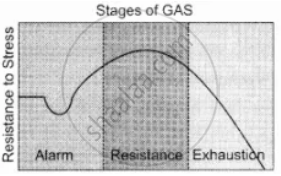Advertisements
Advertisements
Question
Discuss the different stages of the GAS model of stress.
Solution
Hans Seyle (1956), after a lot of research concluded that during stress an organism is confronted with a threat. As a result a series of three closely related physiological processes occur, i.e., a cluster of non-specific responses are being made by the organism that helps it to adapt to stressors. Selye named this phenomenon as General Adaptation Syndrome (GAS).
The phenomenon included the following three stages of reaction :
Alarm stage: In this stage, an organism is suddenly exposed to a threatening and unfamiliar stimulus. This phase involves an immediate reaction to the stimulus. Secretion of adrenaline mobilizes glucose, providing the energy for ‘fight or flight’. The sympathetic division of autonomic nervous system gets activated and prepares the body for extensive action. So, there is an increase in blood pressure, glucose level, release of hormone (cortisol and adrenaline). Thus, in this stage the stressor upsets the homeostasis.
Resistance stage: It is a rebound phase to the stimulation. After the initial level of arousal, the body tunes up fast to react. It is observed that the symptoms that have appeared in the previous stage due to sudden stimuli disappear in this stage. This is because the state of shock (fight or flight) has passed and the individual now knows that the stressor exists as well as body begins to repair itself. This indicates that the power of resistance has increased. However, the body is not able to cope with a new stressor very effectively during this time.
There are certain hormonal responses in the body at this stage known as the adrenocorticotropic axis to resist stress. If you overcome stress and the situation is no longer creating pressure on you then your body continues to repair itself until your hormone levels, heart rate and blood pressure reach a pre-stress state. If suppose, the stress continues for a prolonged duration and your body remains on high alert, then, your body adapts and learns how to live with higher stress level. In this stage, your body continues to secrete stress hormones and your blood pressure remains elevated. You think that you are managing stress well, but your body’s physical response is in different state. If the resistance continues for a too long period then this can lead to the exhaustion stage.
Exhaustion stage : If the exposure to the stressor persists, gradually the body’s resistance breaks down. The resources that help the body to fight depletes continuously. Thus, the final stage of exhaustion sets in. If this stage prolongs, it results in burnout, i.e., a debilitating psychological condition brought on by excessive stress which results in depleted energy reserve, lowered resistance to illness, increased dissatisfaction and pessimism. In this stage the body’s capacity to respond to the stressors collapse.

APPEARS IN
RELATED QUESTIONS
Answer the following question briefly:
Who put forward the General Adaptation Syndrome model of stress?
Answer the following question briefly:
What is the primary cognitive appraisal of stress?
Answer the following question:
What is meant by secondary cognitive appraisal?
Explain the relationship between level of stress and performance with the help of appropriate diagram.
What are the possible consequences of Mehul is sufficiently prepared for his exams but feels tremendously stressed?
The level of stress in an individual that is motivating, healthy and improves performance is known as ______.
Which type of group is family an example of?
An individual's response to events that disturb and threaten his/her well-being is known as ______.
Briefly explain the characteristics of the following groups with a suitable example.
Primary Group
Discuss any five effects of Crowding in an urban setting.
